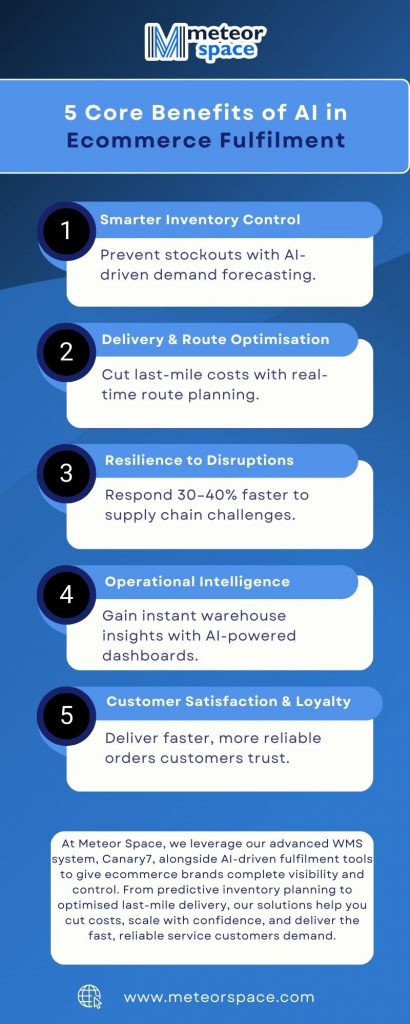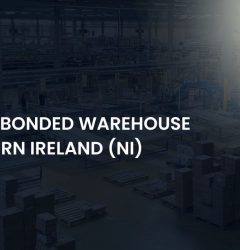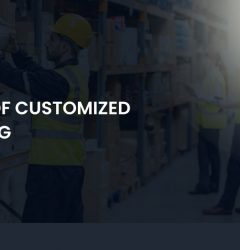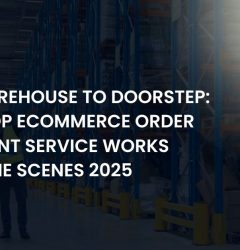27 Aug
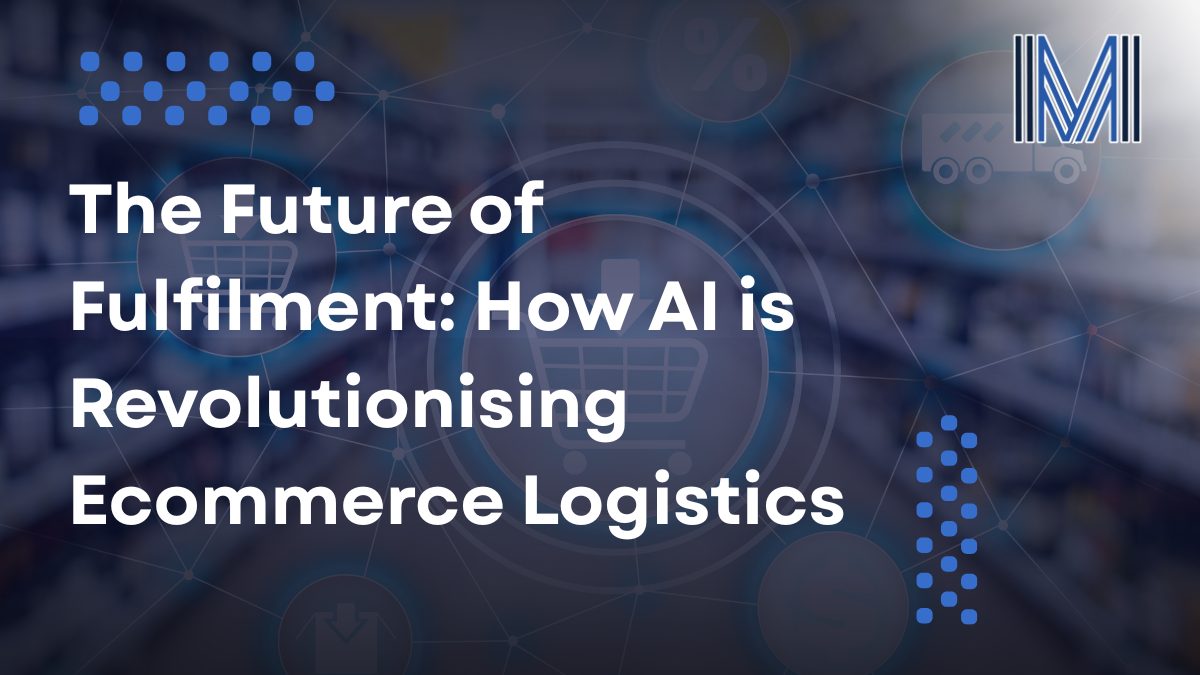
In today’s ecommerce world, AI in fulfilment is no longer a futuristic concept—it’s already reshaping logistics. As customer expectations rise, speed, accuracy, and visibility have become non-negotiable. Research shows that 73% of consumers expect fast delivery, and nearly 69% will avoid returning to a brand after just one poor delivery (Forbes).
This makes fulfilment performance a key competitive advantage. With AI and predictive analytics, ecommerce businesses can forecast demand more accurately, optimise warehouse operations, and reduce costly delays. Instead of reacting to problems as they arise, brands are using AI to proactively manage inventory, streamline last-mile delivery, and improve overall customer satisfaction. For fast-growing companies, leveraging AI in fulfilment isn’t just innovative—it’s essential for long-term scalability and success.
What Is AI in Fulfilment and Why It Matters Now
At its core, AI in fulfilment refers to the use of artificial intelligence and machine learning to automate, optimise, and predict key supply chain activities. Unlike traditional systems that react to issues after they occur, AI-driven fulfilment continuously learns from historical data, real-time inputs, and predictive modelling to anticipate problems before they happen.
Predictive analytics plays a critical role here. By analysing patterns in customer demand, order volumes, and seasonal fluctuations, predictive models can forecast inventory needs and logistics challenges with far greater accuracy than manual planning. This allows businesses to maintain leaner stock levels, cut waste, and improve delivery reliability.
The numbers highlight just how quickly AI technology is shaping logistics:
The predictive analytics market is expected to reach $22.1 billion by 2025 (SuperAGI).
The wider AI in logistics market already stands at $20.1 billion in 2024, with growth forecast at an impressive 25.9% CAGR through 2034 (Global Market Insights).
Businesses using AI-enabled supply chains can respond 30–40% faster to disruptions compared to those relying on manual operations (Forbes).
For ecommerce brands, this means AI is no longer a luxury or experimental tool—it’s becoming a core requirement for competitive fulfilment. From preventing stockouts to reducing last-mile inefficiencies, AI in fulfilment provides the agility, accuracy, and resilience needed to thrive in today’s demanding marketplace.
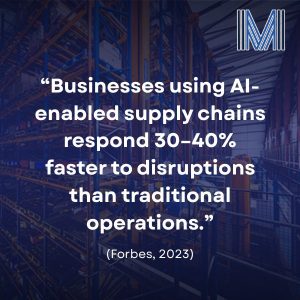
Core Benefits of AI in Ecommerce Fulfilment
The adoption of AI in fulfilment is no longer just about keeping up with technology trends—it’s about gaining a measurable competitive advantage. From the warehouse floor to the customer’s doorstep, AI transforms every step of the fulfilment process. Here are the key benefits ecommerce businesses can unlock:
1. Smarter Demand Forecasting & Inventory Control
AI-powered predictive models analyse sales history, customer behaviour, seasonal peaks, and even external factors like weather or market trends. This allows ecommerce businesses to forecast demand with far greater accuracy than manual planning. The result? Fewer costly stockouts, less overstocking, and smoother inventory turnover—freeing up cash flow while ensuring customers get what they want, when they want it.
2. AI-Powered Delivery & Route Optimisation
Last-mile delivery remains the most expensive part of logistics, often making up over 40% of total shipping costs (Business Insider). AI reduces this waste by continuously adjusting routes in real time, based on factors like traffic, weather, and customer location changes. Industry leaders such as UPS and Veho already use AI-driven delivery planning to cut costs and boost on-time delivery rates—a capability now accessible to growing ecommerce brands.
3. Greater Resilience to Disruptions
Whether it’s supplier delays, port closures, or unexpected demand surges, AI equips fulfilment networks with the ability to respond faster. Studies show AI-enabled supply chains react 30–40% quicker to disruptions than traditional systems (Forbes). This agility helps businesses maintain continuity during volatile conditions and protect the customer experience, even when external factors are unpredictable.
4. Real-Time Operational Intelligence
In traditional fulfilment, managers often rely on delayed or fragmented reporting. AI in fulfilment changes this entirely. By pulling together data from warehouse sensors, WMS systems, carriers, and ecommerce platforms, AI provides a single, real-time view of operations. This enables faster, smarter decision-making—from reallocating inventory to rerouting shipments—without waiting on manual updates.
5. Stronger Customer Satisfaction & Loyalty
In ecommerce, fulfilment is often the make-or-break moment for customer loyalty. AI helps ensure orders are processed with precision, shipped quickly, and tracked transparently. When brands consistently deliver on time (and communicate delays proactively when they do happen), customers are far more likely to return. In fact, research shows that 69% of consumers won’t return to a brand after one poor delivery experience (Forbes).
What to Look for in an AI-Driven Fulfilment Partner
Not all fulfilment providers are equipped to harness the true power of AI in fulfilment. When choosing the right partner for your business, here are the essential features to look for:
1. Real-Time Forecasting
Your provider should offer AI-driven demand forecasting that helps predict order spikes, seasonal surges, and potential stockouts before they happen.
2. AI-Powered Route Optimisation
Delivery efficiency depends on smart last-mile planning. Look for tools that continuously adapt to traffic, weather, and location data to keep deliveries on schedule and costs under control.
3. Seamless ERP/WMS Integration
A strong partner will integrate AI capabilities with your existing platforms. At Meteor Space, our advanced WMS system, Canary7, connects seamlessly with ecommerce stores and ERP software to deliver real-time data visibility.
4. Smart Dashboards & Actionable Insights
Access to live performance dashboards powered by AI ensures you can make faster, smarter operational decisions—without waiting on manual reporting.
5. Proven ROI Tracking
The right partner doesn’t just promise results—they show them. Transparent reporting on costs, speed, and customer satisfaction helps you measure how AI is improving your fulfilment.
While you’re here, why not take a look inside our warehouse? Our advanced automated systems are designed to boost efficiency, cut energy waste, and support more sustainable fulfilment operations.
What to Look for in an AI-Driven Fulfilment Partner
Not all fulfilment providers are equipped to harness the true power of AI in fulfilment. When choosing the right partner for your business, here are the essential features to look for:
1. Real-Time Forecasting
Your provider should offer AI-driven demand forecasting that helps predict order spikes, seasonal surges, and potential stockouts before they happen.
2. AI-Powered Route Optimisation
Delivery efficiency depends on smart last-mile planning. Look for tools that continuously adapt to traffic, weather, and location data to keep deliveries on schedule and costs under control.
3. Seamless ERP/WMS Integration
A strong partner will integrate AI capabilities with your existing platforms. At Meteor Space, our advanced WMS system, Canary7, connects seamlessly with ecommerce stores and ERP software to deliver real-time data visibility.
4. Smart Dashboards & Actionable Insights
Access to live performance dashboards powered by AI ensures you can make faster, smarter operational decisions—without waiting on manual reporting.
5. Proven ROI Tracking
The right partner doesn’t just promise results—they show them. Transparent reporting on costs, speed, and customer satisfaction helps you measure how AI is improving your fulfilment.
Author:
Claire Cox
Claire Cox is a Marketing Executive at Meteor Space, specialising in content creation and digital strategy for ecommerce and fulfilment solutions. She focuses on developing engaging, SEO-driven content that highlights industry insights and showcases how Meteor Space supports brands with scalable logistics.
UPDATED ON: 27/08/2025
FAQs
What is AI in fulfilment?
AI in fulfilment uses artificial intelligence and predictive analytics to optimise logistics. It helps ecommerce brands forecast demand, automate warehouse operations, and streamline delivery for faster, more reliable customer experiences.
How does AI improve supply chain efficiency?
AI analyses data in real time, enabling smarter decisions on inventory, routing, and staffing. This reduces costs, prevents stockouts, and allows supply chains to respond 30–40% faster to disruptions compared to traditional methods.
Is AI in fulfilment only for large retailers?
No—AI-driven fulfilment is now accessible for small and mid-sized ecommerce businesses. Cloud-based systems and advanced WMS platforms like Canary7 make it scalable and cost-effective for growing brands.
How can Meteor Space help my business adopt AI fulfilment?
At Meteor Space, we use our advanced WMS system, Canary7, to deliver AI-enabled forecasting, real-time dashboards, and automated logistics processes. This allows ecommerce businesses to scale confidently while keeping fulfilment efficient and customer-focused.
